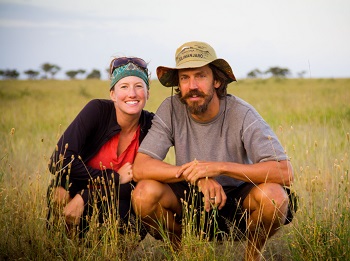GSPM alum Kip Patrick and his wife Liz Zipse counted whale sharks in the Philippines, picked up trash in Borneo, practiced English with monks in Laos, painted schools in Uganda, and distributed shoes in El Salvador as they spent 16 months traveling 30,000 miles in 24 countries and three continents volunteering at least one day each week.
The husband and wife team embarked on their quest to prove that short-term volunteering can help change the world. Their long journey of adventure and kindness led to being named National Geographic's Travelers of the Year for 2014.
A senior communications consultant at the World Bank in Washington, DC, Patrick earned a graduate certificate in Public Relations from GW in 2008. Patrick is also a journalist who has written extensively about his travels for several online publications including the Huffington Post, Men's Journal and Enterprise Magazine.
"We are pleased and not at all surprised to hear of Kip's recognition by National Geographic. He is the definition of the peripatetic PR professional - always off to an adventure and doing some good along the way... well deserved!" said Lawrence Parnell, associate professor and program director for the Masters in Strategic Public Relations.
"Returning to grad school at GSPM rekindled a creativity and entrepreneurial spirit that had begun to fade in the day-to-day pursuit of a career," said Kip. "Lessons I learned at GSPM stayed with me while traveling across Asia, volunteering through Africa and even back here in Washington working at the World Bank."
Kip and Liz' blog on volunteering, 1 of 7, has become an online platform for those who believe that when combined, small efforts by individuals can move mountains.
According to Kip, "We believe that as this movement grows we can show that although one person can make a difference giving back in a small way, with exponential growth that one person becomes two, that becomes four, that becomes 400,000, and that many people pushing to make the world a better place will do exactly that."
Read the full story in the NatGeo website


